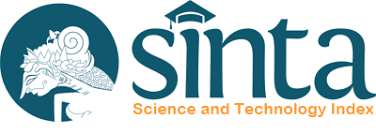Abstract
Reputasi dan Kredibilitas sebagai Upaya untuk Mengatasi Masalah Koordinasi dan Reformasi yang Berkelanjutan
Bahasa Abstract
Reputasi dan Kredibilitas sebagai Upaya untuk Mengatasi Masalah Koordinasi dan Reformasi yang Berkelanjutan
References
[1] ADB & Bappenas. (2019). Policies to support the development of Indonesia’s manufacturing sector during 2020–2024: A joint ADB–BAPPENAS report. Manila: ADB. https://www.adb.org/publications/ policies-manufacturing-sector-indonesia-2020-2024.
[2] Alesina, A., Roubini, N., & Cohen, G. D. (1997). Political cycles and the macroeconomy. MIT press.
[3] Austen-Smith, D. (1987). Interest groups, campaign contributions, and probabilistic voting. Public Choice, 54(2), 123-139. doi: https://doi.org/10.1007/BF00123002.
[4] Baron, D. P. (1989). Service-induced campaign contributions and the electoral equilibrium. The Quarterly Journal of Economics, 104(1), 45-72. doi: https://doi.org/10.2307/2937834.
[5] Chuaire, M. F., & Scartascini, C. (2014), The politics of policies: Revisiting the quality of public policies and government capabilities in Latin America and the Caribbean. Policy Brief, IDB-PB-220. Inter-American Development Bank. https://publications.iadb.org/en/publication/12095/ politics-policies-revisiting-quality-public-policies-andgovernment- capabilities.
[6] Chuaire, M. F., Scartascini, C. G., & Tommasi, C. (2014). State capacity and the quality of policies: Revisiting the relationship between openness and the size of government. IDB Working Paper Series, IDB-WP-532. Department of Research and Chief Economist, Inter-American Development Bank. https://publications.iadb.org/en/publication/12116/ state-capacity-and-quality-policies-revisiting-relationshipbetween- openness-and.
[7] Fidrmuc, J., & Noury, A. G. (2003). Interest groups, stakeholders, and the distribution of benefits and costs of reform. Prepared for the GDN Global Research Project: Understanding Reform. http://www.fidrmuc.net/research/intgroups.pdf.
[8] Henderson, J. V., & Kuncoro, A. (2004). Corruption in Indonesia. NBERWorking Paper, w10674. National Bureau of Economic Research. https://www.nber.org/papers/w10674.
[9] Henderson, J. V., & Kuncoro, A. (2006). Sick of Local Government Corruption? Vote Islamic. NBER Working Paper, w12110. National Bureau of Economic Research. https://www.nber.org/papers/w12110.
[10] Henderson, J. V., & Kuncoro, A. (2011). Corruption and local democratization in Indonesia: The role of Islamic parties. Journal of Development Economics, 94(2), 164-180. doi: https://doi.org/10.1016/j.jdeveco.2010.01.007.
[11] Kroszner, R. S., & Stratmann, T. (1998). Interest-group competition and the organization of congress: theory and evidence from financial services’ political action committees. American Economic Review, 88(5), 1163-1187.
[12] Kuncoro, A. (2006). Corruption and business uncertainty in Indonesia. ASEAN Economic Bulletin, 23(1), 11-30.
[13] Kuncoro, A. (2008). A simple theoretical model of bribe uncertainty. Economics and Finance in Indonesia, 56(3), 275- 296.
[14] Kydland, F. E., & Prescott, E. C. (1977). Rules rather than discretion: The inconsistency of optimal plans. Journal of Political Economy, 85(3), 473-491.
[15] Laban, R., & Sturzenegger, F. (1994). Distributional conflict, financial adaptation and delayed stabilizations. Economics & Politics, 6(3), 257-276. doi: https://doi.org/10.1111/j.1468- 0343.1994.tb00100.x.
[16] Lucas Jr, R. E. (1972). Expectations and the neutrality of money. Journal of Economic Theory, 4(2), 103-124.
[17] North, D. (1990).Atransaction cost theory of politics. Journal of Theoretical Politics, 2(4), 355-367.
[18] OECD. (2018). OECD Economic Survey: Indonesia. Paris: Organisation for Economic Co-operation and Development. http://www.oecd.org/economy/ indonesia-economic-snapshot/.
[19] Persson, T., & G. Tabellini. (1990). Macroeconomic policy, credibility and politics. Chur, Switzerland: Harwood Academic Publisher.
[20] Rogoff, K. (1985). The optimal degree of commitment to an intermediate monetary target. The Quarterly Journal of Economics, 100(4), 1169-1189. doi: https://doi.org/10.2307/1885679.
[21] Rogoff, K. (1990). Equilibrium political budget cycles. The American Economic Review, 80(1), 21-36.
[22] Salisbury, H.E. (1993). The new emperors: China in the era of Mao and Deng. New York: Avon Book.
[23] Sargent, T. J., & Wallace, N. (1975). ”Rational” expectations, the optimal monetary instrument, and the optimal money supply rule. Journal of Political Economy, 83(2), 241-254. doi: https://doi.org/10.1086/260321.
[24] Sargent, T. J., & Wallace, N. (1976). Rational expectations and the theory of economic policy. Journal of Monetary Economics, 2(2), 169-183. doi: https://doi.org/10.1016/0304- 3932(76)90032-5.
Recommended Citation
Indrawati, Sri Mulyani; Kuncoro, Ari; and Ikhsan, Mohamad
(2019)
"Reputasi dan Kredibilitas sebagai Upaya untuk Mengatasi Masalah Koordinasi dan Reformasi yang Berkelanjutan,"
Jurnal Ekonomi dan Pembangunan Indonesia: Vol. 19:
No.
2, Article 8.
DOI: 10.21002/jepi.2019.16
Available at:
https://scholarhub.ui.ac.id/jepi/vol19/iss2/8







